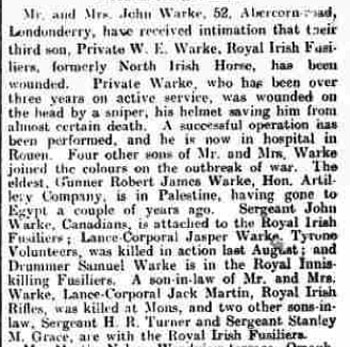Private William Edwin Warke
William Edwin Warke was born on 23 January 1889 at 7 Fountain Place, Londonderry, the fifth of twelve children of tailor John Warke and his wife Elizabeth Jane (nee Philson). On the outbreak of war he was living with his family at 52 Abercorn Road, Londonderry, and working as a book-keeper for Sir John B. Johnston in the Victoria Buildings.
Warke enlisted in the North Irish Horse at Londonderry on 7 September 1914 (No.1156). While in training with the regiment at Antrim he was twice disciplined: on 3 February 1915 for obtaining a pass for the weekend under false pretences (confined to base for 7 days and leave stopped for 1 month); and on 7 April 1915 for being absent from watchsetting for five days (forfeits 5 days' pay and 10 days' Field Punishment No.2).
Warke embarked for France on 2 June 1915 with a reinforcement draft, and was posted to A or D Squadron. In May the following year these squadrons came together with E Squadron to form the 1st North Irish Horse Regiment, serving as corps cavalry to VII, XIX, then V Corps.
Twice more he fell foul of the authorities. On 7 July 1916 he was awarded four days' field punishment No.1 for using insubordinate language to an NCO, and on 15 January 1917, seven days' Field Punishment No.1 for using improper language to an NCO.
In September 1917 the 2nd North Irish Horse Regiment was disbanded and most of its men, together with some surplus to the needs of the 1st NIH Regiment, were transferred to the 9th (Service) Battalion, Royal Irish Fusiliers – renamed the 9th (North Irish Horse) Battalion. Warke, like most, was transferred on 20 September. He was issued a new regimental number – 41457.
On 15 December 1917, while fighting with his battalion south of Marcoing during the Battle of Cambrai, Warke sustained a bullet or shrapnel wound to the head. After initial treatment at the 6th General Hospital at Rouen, on 31 December he was evacuated to England, where he was treated at the 3rd Western General Hospital, Cardiff, and the Berridge Road Hospital, Nottingham.
On 22 February 1918 Warke returned to duty, joining the 10th (Reserve) Battalion, Royal Irish Fusiliers. However he was soon found unfit for infantry service and on 4 May he was transferred to the Royal Defence Corps for home service (No.73205). On 4 July he was transferred to the 22nd (Service) Battalion, Northumberland Fusiliers (No.87428), but three weeks later returned to the Royal Defence Corps, where he was posted to No.199, then No.155 Company, at York.
Warke was transferred to Class Z, Army Reserve, on 5 March 1919. His military character was recorded as "good". A medical board had assessed his injuries and illnesses (head wound, disorderly action of the heart and severe dyspepsia – "pale & thin looking ...complains of pain & vomiting after meals") and recommended he be paid a pension based on 20 per cent disability. His final discharge from the army came through on 31 March 1920.
Warke died from a perforated gastric ulcer at the City and County Infirmary, Londonderry, on 12 July 1921. He was buried in the City Cemetery. The following year his mother wrote to the authorities apologising for not returning the paperwork for his medals:
I was looking over some old papers and came on the enclosed form which I thought was completed by me and forwarded on to you a few months ago. I own it was pure neglect on my part which I hope you will overlook this time. I have three other sons one at home, and the other two were killed in action. the soldier for whom I am claiming the medals died as the results of being gassed and wounded.
Four of Warke's brothers served in the war: Private Jasper McCleery Warke, of the Royal Inniskilling Fusiliers died of wounds on 8 August 1917; Private Samuel Warke of the London Regiment was killed in action on 5 September 1918; 2nd Lieutenant Robert James Warke served in the Royal Inniskilling Fusiliers; and Sergeant John Warke served with Canadian Expeditionary Force. In addition, his brother-in-law, Rifleman John Martin, was killed in action on 18 September 1914 serving with the Royal Irish Rifles, and his brothers-in-law, Lance Sergeant Stanley Montague William Grace and Sergeant Harold Rodney Turner, served with the Royal Irish Fusiliers.

Londonderry Sentinel, 1 January 1918

Londonderry Sentinel, 20 September 1917

Gravestone of William Warke's brother Jasper at Lijssenthoek Military Cemetery
